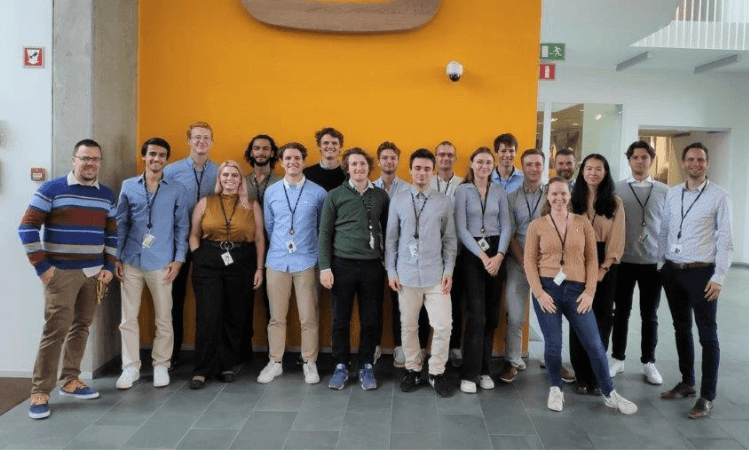Having worked in digital transformation at PwC, Allison Farnan saw the benefits of joining a Master in Business Analytics and AI program. Here, she tells us everything you should know before applying
The Master in Business Analytics and AI at Vlerick Business School combines core skills in data analytics with expertise in cutting-edge tech.
Allison Farnan, a master’s student at Vlerick, who goes by the name Ally, travelled from the US to study in Belgium for her degree. Before joining, Ally worked at Big Four accounting firm PwC where she specialized in product development and artificial intelligence.
Here are the five things you should know before applying to a Master in Business Analytics:
1. You don’t need to have coding experience to join a Master in Business Analytics
A Master in Business Analytics is quant-heavy and you’ll spend a lot of time becoming well-versed in coding language by using advanced coding languages such as Python.
While having some experience in coding before you join the program would be beneficial, it isn’t essential.
When Ally joined the Master in Business Analytics and AI at Vlerick, she didn’t have any experience in coding. In her application and interview, she emphasized her skills and experience in other areas and showed she was willing to take on the added challenge of learning to code.
Introductory courses in programming at Vlerick provide students the technical skills they need until they’re ready to take on the one-week ‘Hackathon’. During this event, students work in a team of data scientists and business analysts to create innovative codes that solve complex business problems and create market value for the company.
2. You’ll need to have an interest in how tech works
While you may not need to be an advanced coder, being tech and data-savvy is crucial if you’re going to quickly pick up the skills in an intensive business analytics master’s degree.
Philippe Baecke, program director of the Master in Business Analytics and AI at Vlerick Business School, says “in a lot of new technology innovations, data and analytics is a key component and gaining a good understanding can only be done through hands-on learning.”
Across the one-year program, students on the Master in Business Analytics and AI undertake the data-driven business Innovation project. Working in teams, students develop a tech-driven innovation from start to finish, which they then pitch in front of potential investors alongside their marketing plan and financial modelling.
3. Be prepared to become an expert in AI
In the business world, it’s impossible not to see the impact of technological advancements in artificial intelligence, cloud computing, and deep learning.
The Master in Business Analytics and AI at Vlerick hones in on these cutting-edge tech trends and their implications in business in courses such as Cloud Solutions and Modern Data Platforms, Decision Optimization and Automation, and Sustainable AI.
“At the end of the program, our students will be able to build AI systems and models,” says Philippe.
The curriculum has been developed in close collaboration with business experts specializing in AI from companies such as ML6, Imec Faktion, Metamaze, and Allianz, he adds.
Ally says that, despite working closely with cloud and digital technologies during her role at PwC, she felt she needed to gain a broader perspective of disruptive tech trends to stay ahead.
“With every course at Vlerick, my eyes are being opened and there’s a whole new field of things that I never even knew existed,” she says.
While AI will replace 85 million jobs, 97 million new jobs will be created by 2025 as a result, predicts the World Economic Forum.
“The students of this program will be perfectly trained for these new jobs that will arise as AI is adopted into more and more companies and industries,” says Philippe.
Students will get an insight into potential careers in AI during the study trip to Amsterdam, which includes company visits to Google, Amazon, Tesla, and UberEats.
Plus, the two-month long in-company consultancy project will give them hands on experience working on a real-life business challenge.
4. A Master in Business Analytics will develop your soft skills and technical skills
To work in analytics, a strong grasp of technical skills is key. Yet business leaders also need to develop soft skills that can bridge the gap between data and general business management.
“We want to increase students’ managerial thinking and how they collaborate with others to bring out the strengths of each individual,” says Philippe.
The Master in Business Analytics and AI at Vlerick Business School includes a component on developing managerial skills, with courses such as Career Skills, Presentation Skills, Diversity, Equity and Inclusion Track, and Change Management.
“Introducing tech within an organization can come with some difficulties as the business and employees adjust so being able to manage that for a smooth process is crucial,” says Philippe.
You’ll also work closely with your classmates, each bringing diverse perspectives.
“As well as the course content, my classmates are also opening my eyes to different business issues,” says Ally.
5. You won’t be limited to a career in tech after a Master in Business Analytics
Data and tech advancements are making their way into just about every industry. That means for grads, there’s no shortage of career opportunities.
“We combine technical courses with an understanding of business knowledge and each functional domain within a business, such as finance, marketing, HR, operations, showing how data analytics ties in with each of these,” says Philippe.
A three-week bootcamp also allows students to dive specifically into their chosen industry to learn the ins and outs of how data analytics is applied anywhere from the sports industry to healthcare to fast-moving consumer goods (FMCG).
“No matter the industry students are from or aspire to join, the program will help them get ahead of how AI and data analytics will inevitably change it in the future—if it hasn’t already,” says Phillipe.
